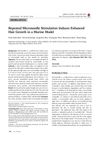17 citations,
November 2021 in “Journal of Cosmetic Dermatology” Combination therapies for androgenetic alopecia work best but can have significant side effects and costs.
 10 citations,
September 2020 in “Journal of Cosmetic Dermatology”
10 citations,
September 2020 in “Journal of Cosmetic Dermatology” Deeper microneedling boosts hair growth, with 0.6mm needles and minoxidil being most effective.
 13 citations,
September 2020 in “Dermatologic Therapy”
13 citations,
September 2020 in “Dermatologic Therapy” Microneedling may help hair loss, but needs more research.
 29 citations,
May 2020 in “npj Regenerative Medicine”
29 citations,
May 2020 in “npj Regenerative Medicine” Immune cells help regulate hair growth, and better understanding this can improve hair loss treatments.
2 citations,
April 2020 in “PubMed” 3 citations,
March 2020 in “Our Dermatology Online” Microneedling can improve hair growth in people not responding to standard treatments.
 24 citations,
January 2019 in “Journal of Cosmetic Dermatology”
24 citations,
January 2019 in “Journal of Cosmetic Dermatology” Combining platelet-rich plasma, microneedling, and minoxidil improves hair growth.
 68 citations,
March 2018 in “Biomaterials”
68 citations,
March 2018 in “Biomaterials” Tiny needles with valproic acid can effectively regrow hair.
24 citations,
January 2018 in “Journal of Cutaneous and Aesthetic Surgery” Combining microneedling with minoxidil is more effective for hair growth than using minoxidil alone.
 178 citations,
April 2017 in “Journal of The American Academy of Dermatology”
178 citations,
April 2017 in “Journal of The American Academy of Dermatology” Minoxidil, finasteride, and low-level laser light therapy effectively treat hair loss.
 20 citations,
January 2017 in “Actas Dermo-Sifiliográficas”
20 citations,
January 2017 in “Actas Dermo-Sifiliográficas” Recent advances in hair loss treatments show significant progress.
 49 citations,
August 2016 in “Aesthetic Surgery Journal”
49 citations,
August 2016 in “Aesthetic Surgery Journal” Micro-needling effectively improves wrinkles, scars, and hair growth, but proper technique and safety are important.
 55 citations,
January 2016 in “Annals of Dermatology”
55 citations,
January 2016 in “Annals of Dermatology” Microneedle stimulation can increase hair growth in mice.
 25 citations,
June 2015 in “Clinical, Cosmetic and Investigational Dermatology”
25 citations,
June 2015 in “Clinical, Cosmetic and Investigational Dermatology” Microneedling helps increase the absorption of a melanin product into hair follicles, which may improve laser hair removal effectiveness.
 131 citations,
May 2015 in “Experimental Dermatology”
131 citations,
May 2015 in “Experimental Dermatology” Microneedles help improve skin appearance and deliver skin treatments effectively, but safety concerns need more research and regulation.
 68 citations,
January 2015 in “Indian Journal of Dermatology”
68 citations,
January 2015 in “Indian Journal of Dermatology” Microneedling can effectively promote new hair growth in men with hair loss who didn't improve with traditional treatments.
 136 citations,
January 2013 in “International Journal of Trichology”
136 citations,
January 2013 in “International Journal of Trichology”  37 citations,
July 2010 in “International Journal of Trichology”
37 citations,
July 2010 in “International Journal of Trichology” Hair loss affects quality of life, self-esteem, and confidence, but younger patients cope better.
 125 citations,
May 2007 in “Journal of The American Academy of Dermatology”
125 citations,
May 2007 in “Journal of The American Academy of Dermatology” The BASP classification is a detailed and accurate way to categorize hair loss in both men and women.
 829 citations,
May 2007 in “Nature”
829 citations,
May 2007 in “Nature” Hair follicles can regrow in wounded adult mouse skin using a process like embryo development.





















